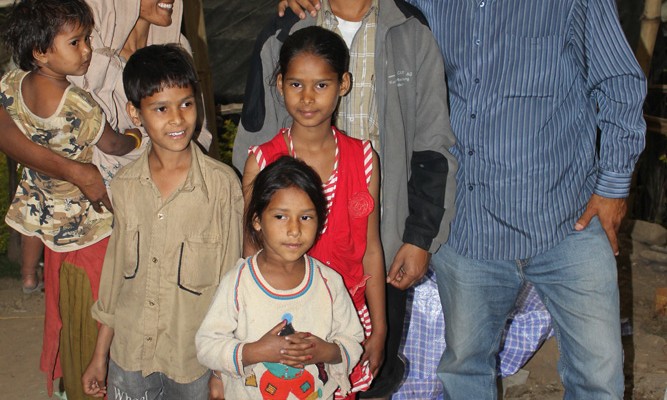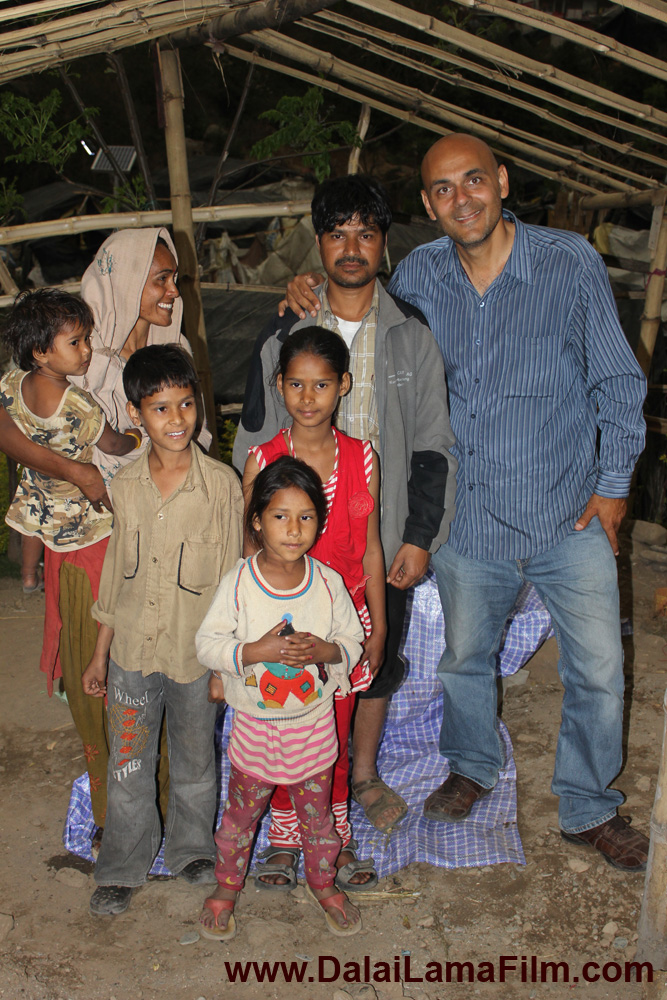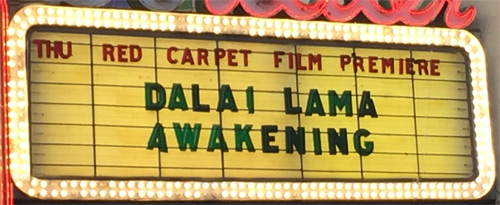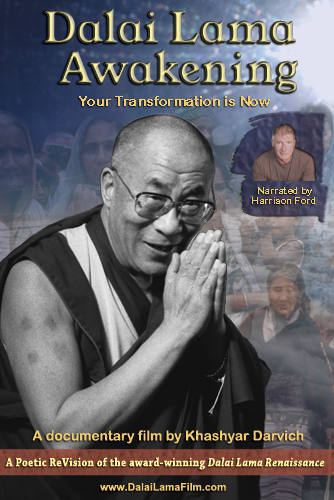

In this modern world of busy schedules, quick ‘hellos,’ and forgotten promises, there are few life-changing opportunities that we encounter along the way, where we feel that with a little bit of effort, or an amount of money that feels very small to us, that we can profoundly and dramatically make a difference in another person’s life.
When I was in India for 3 months this Spring (2011), in production for my new documentary film entitled ‘Matrix of Compassion,’ I was walking down the dusty streets of Dharamsala, India in the Himalayan mountains, when I was surprised to see a face that I vaguely recognized.
Sitting on the ground on the side of the road, with his portable shoeshine and cobbler supplies positioned on a wooden box and a dusty blanket, and in front of the same hotel where I had stayed 10 years earlier during the filming of my previous ‘Dalai Lama Renaissance’ film, was Viru, a 30-something year old shoe cobbler who had repaired my sandles during that previous first trip to India.
I was surprised to see that he was still there, setting up his portable one-man business in the exact same spot.
His mustache was just as thick, and his hair was just as healthy-looking and bushy (although now a salt and pepper color).
As I looked down onto his face, I was happily surprised that he recognized me as well, and I felt the comfort of meeting a friend again after 10 years.
He offered me a free shoeshine, but I was on my way somewhere, so I thanked him and took a rain-check.
Whenever I would walk down the street past his building-less roadside shoe repair business, he would offer to shine my shoes for free.
After one month of filming for the “Matrix of Compassion” documentary film, I decided that it would be helpful if we added an Indian crew member to the team, and I spent a couple of days reflecting upon who would be the best choice. I wanted to find someone who had a good heart, and who I thought would work hard and was open to receiving direction, and who could learn quickly.
I decided to offer a paying job to Viru as a video cameraman, and I made the commitment to teach him the art and craft of cinematography.
Viru has never used a video camera before in his life, but I imagined that because his shoe-repair work required him to sew carefully and do detailed work with his hands, that he probably had good hand-eye coordination. I also observed that he was one of the most hard-working people I had met in India, and unlike some of the other impoverished Indians I had met, Viru had NEVER asked me for money, even though I knew that he and his family were poor.
I just had a good feeling in my heart about him.
So, I gave Viru one of our video cameras, and had him join our film crew. Each day, after he walked one hour up the mountain from his village to upper Dharamsala, I directed him as to how to use the camera, how to hold it, how to frame a shot, and the types of things to film. And at the end of each day, we would spend one or two hours at a cafe and conduct film-watching sessions to review the footage that he had filmed that day, and offer suggestions as to how to improve his technique.
It was inspiring to see how, through hard work and dedication and sheer effort, Viru’s camera work became better and better every single day, until after 2 months working on the crew, Viru was the hardest-working member of our film crew, and he shot some of the best and most beautiful video footage that I brought back with me to the U.S. from India.
I could only imagine that if Viru, with his intelligence, character and work-ethic, had the same opportunity that I had to receive an education, what he could have accomplished in his life.
One day, half-way through our 3 month film production, Viru invited me to come to his home in the village where he lived, for dinner, and to meet his family.
I took a taxi with Viru for the 30 minute drive down the monkey-filled and windy roads of the rocky mountain-side, to lower Dharamsala, towards his village.
Driving around a curve in the road, I saw his village, nestled on an elbow of land that no one else wanted: a haggard hodgepodge of black plastic tents, that looked like they could be blown away by a strong wind.
As I walked down the dirt path inside his village, through groups of black plastic tents and naked children who were not wearing shoes, I was somehow surprised to see that Viru’s house was the same: a one room bamboo frame hut covered with black plastic as the walls, with a fire pit inside for cooking, and no running water nor electricity.
When they needed to use the toilet, they walked down a path to a rocky exposed stream, and did what they needed to do there, then washed themselves in the stream water, and walked back.
I was told later that if every person in the world used toilet paper, then there would not be any trees standing.
As I met his family, I learned that Viru had 4 children, ages 12, 10, 6 and 2, and that none of them had EVER been to school.
They could not read nor write, nor could they speak English.
But they were such good kids, with sincere smiles and good-hearted faces. I could see: like father, like children. Viru’s wife was also a wonderful person, dedicated to her children and family, as she cooked her family’s Indian food over their fire, and washed their clothes in the same river that their village used for a toilet.
When there was work, Viru’s wife would accept a job collecting bottles and other recyclables for a local recycling company.
I knew that Viru and his family perhaps made a total of 100 rupees per day (less than $3 US dollars).
I wanted to experience, feel and know how Viru’s family lived, so I decided to stay in their village for 3 days. I lived in their black plastic tent house, ate what they ate (which was some of the best India food I ever had), slept where they slept, and yes, I went to the bathroom where they went to the bathroom.
That first time walking to the river was difficult 🙂 But after I did what I needed to do, it wasn’t so bad, and I realized that we in the U.S. and in more developed countries, have SO much. We are so wealthy and fortunate, even if we don’t own a house, or are millionaires.
Nearly all of us have enough food. We have shelter. We have indoor toilets. We are not in danger of starving.
Viru told me that there was days when they did not have enough money to buy food, and on those days, his children did not eat.
But, THEY did have something that many Americans did not: the realization that THINGS do not bring us happiness. Happiness comes from within, as well as what we share with our family and friends.
Happiness does NOT come from material things, or possessions, or… cars or money or status. It comes from who we are.
And then, one evening, my heart told me that aside from the calling I felt to make this documentary film about personal and spiritual transformation, that I had something else meaningful and important to do. And that, with what is really very little money for an American, that I can make a huge and life-long difference in the lives of Viru’s children.
I knew on my heart that I had no choice but to act.
This was my chance to make a real difference in the lives of 3 children.
I learned that after the cost of the registration fee for each child (about $75 per child), as well as purchasing school clothes and shoes (about $20 per child), that the cost of sending each child to a decent private school was only about $8 per child per month.
How could I go to a restaurant in my home city of Los Angeles, knowing that for the cost of what I pay for my meal, that I can send 3 children to a good private school for an entire month?
So, I decided to spend $24 per month to send 3 of his school-age children to school, give them an education, and change their lives forever.
It was something that I HAD to do.
If I did not act on this opportunity to make a real and lasting and powerful difference in the lives of these 3 children, then… I would not be able to sleep at night.
So, today, I just sent the money today to register his 3 children to school, to pay for their school clothes and shoes, as well as to cover their first month of tuition fees. I also sent about $45 (2,000 rupees) extra just so his family could buy food or other essentials, and reduce their financial stress for perhaps a month).
Right before I left India, I promised Viru that I would help his children go to school, and I told him that it was important that they received an education. (Viru had to drop out of public school when he was 10, to go work as a shoeshine boy and shoe cobbler, just like his father had done before him).
Because of the succession of poverty in his family, neither Viru, nor his father before him, had the opportunity to break the cycle of needing to work beginning at a small age, and consequently did not receive a basic education so that their lives could be better than the generation before them.
As a child, I took for granted that I went to school every day, that I had clothes and food, that I attended and graduated from High School, that I went to college, and now I am doing something that I really enjoy (Producing and Directing documentary film that have positive and inspiring messages).
Viru cried when I made him this promise to fund his children’s education, and now he calls me his big brother.
I called Viru tonight, and told him that I had sent the money, and Viru again thanked me from a place deep in his heart, in a way that I have been rarely thanked or appreciated or valued before.
It seems unfair that what is so little money for me can make such a huge and momentous difference in the lives of 3 children, whose eyes are so clear and bright, but who were facing a life of poverty and illiteracy, and a lack of hope.
I was blessed that as a result of traveling to India to make a film, that I serendipitously and unexpectedly came across 3 young children who I could easily, directly and personally help. Yes, I could have, from America, sent money to an aid organization that helps to feed children and families. But it is rare that we have the opportunity to directly meet people whose lives we can easily change, and it somehow feels more satisfying that I help this family, and these children, directly.
They know that there is one person in the Western world (that they have only seen in distant images), who cares about them and who wants to help.
If Viru only really knew how much knowing him and his family has changed me, and how helping him has filled my heart with joy, warmth and love, and a deep satisfaction that comes only from make a real difference in the world.
Viru told me that his children felt despair and shame, when they saw some other children in their village go to public school, when, because of a lack of money, they could not.
I saw the pain and the shame on Viru’s face as he answered my question that he wanted to send his children to school and give them a better life, but he couldn’t.
I feel that I have already made a difference in their lives, by simply expressing that someone cares about them. Someone in this big large world that they cannot touch or see from a television that they don’t own, nor on webpages on a computer that they can only dream of using, cares about them and is showing it through action.
Every single person has a way to help others and make the world a little bit better than when they first arrived on the planet.
It is up to us to listen quietly within our hearts, and understand what gift we have to share with others, and then act on that realization.
Khashyar Darvich
Producer-Director
‘Dalai Lama Renaissance’ and ‘Matrix of Compassion’
www.DalaiLamaFilm.com and www.MatrixOfCompassion.com

Sign up for our Wakan Films email newsletter and receive the very first and latest news from Director Khashyar Darvich and Wakan Films about the release of our new inspiring films, and where they are screening near you.

Sign up for our Wakan Films email newsletter and receive the latest news from Director Khashyar Darvich and Wakan Films about the release of our new inspiring films, and where they are screening near you.